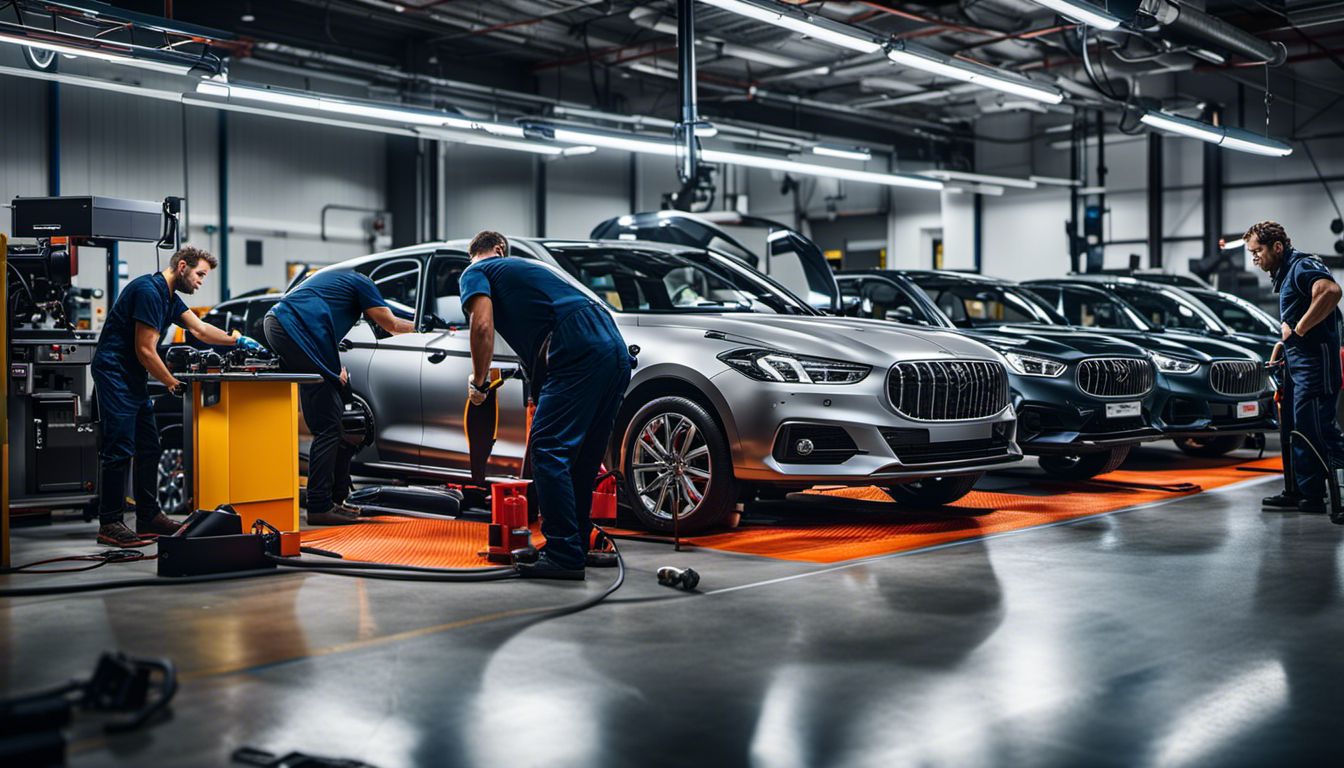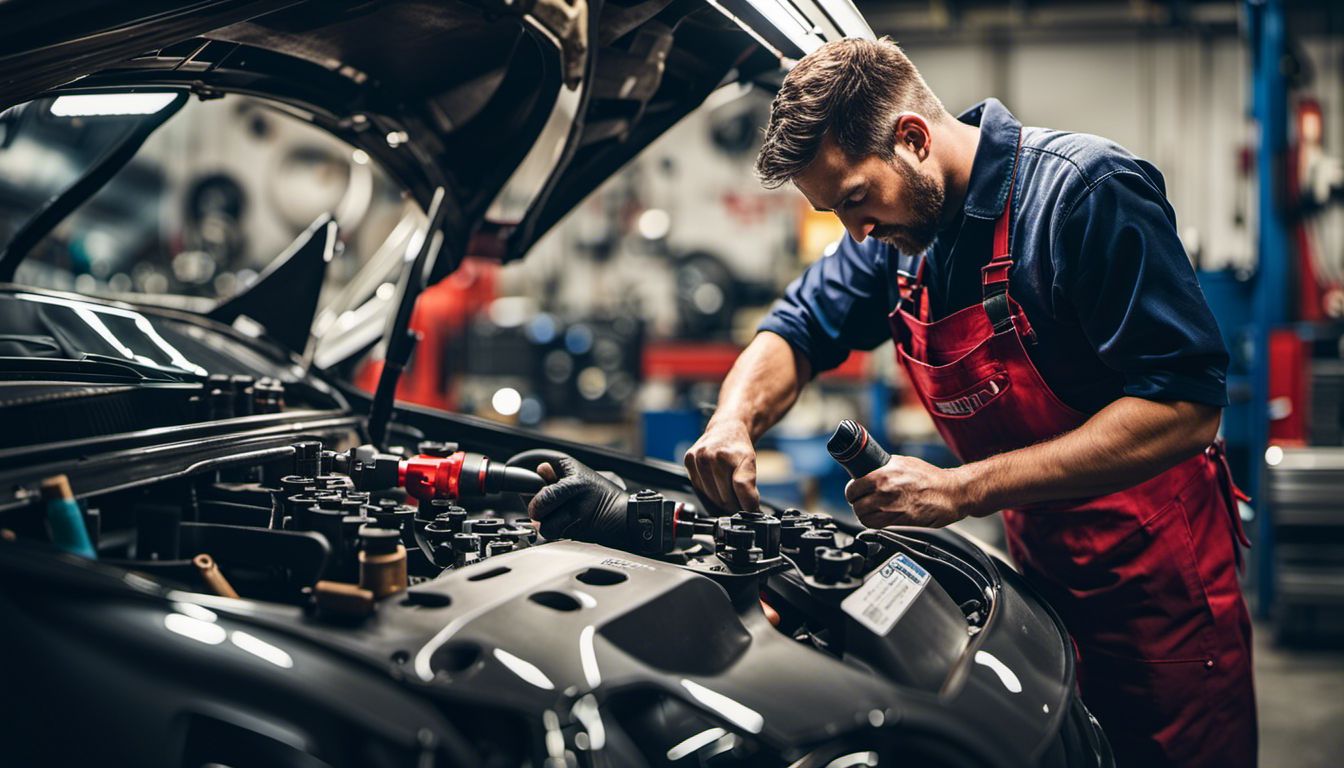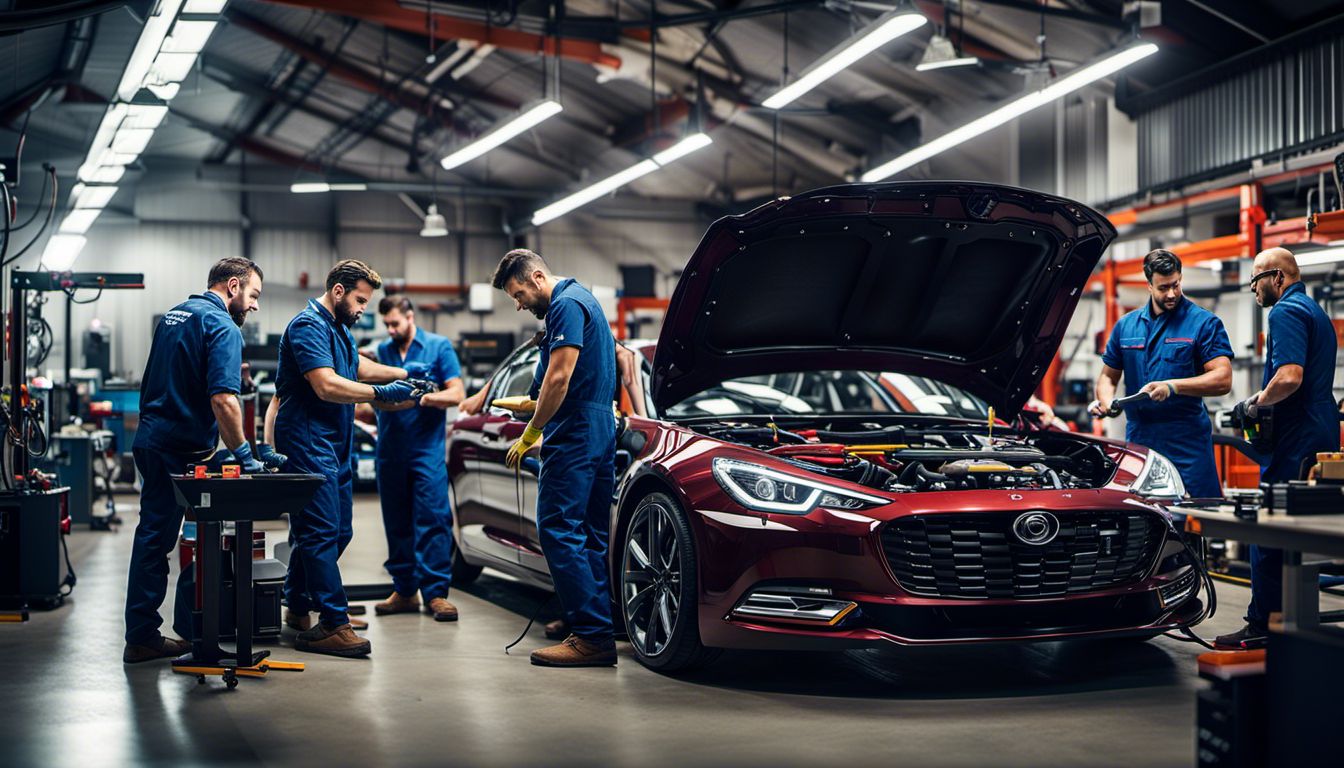Are you a car dealership owner struggling to see improvement in your service and technician results? You’re not alone as many dealers face challenges in this area. This article will introduce the Fixed Ops Leaderboard, an innovative solution that has proven successful in driving performance across various dealership operations.
Stay with us as we delve into how you can use it to revolutionize your service department’s results!
Key Takeaways
- The Fixed Ops Leaderboard is an innovative solution that has proven successful in driving performance across various dealership operations, including service and technician results.
- Fixed operations play a crucial role in dealerships by increasing profitability, developing personnel, and improving performance.
- Consistent processes, such as using tools like RevolutionParts’ “Obsolescence Buster” and implementing streamlined customer traffic management strategies, are essential for success in fixed operations.
- Employee education is important for enhancing the performance and success of fixed operations by promoting knowledge sustainability, reducing turnover, and creating happy employees.
- Clear goals and Key Performance Indicators (KPIs) are crucial in driving service and technician results for car dealers.
Understanding the Role of Fixed Operations in Dealerships

Fixed operations stand as a linchpin within dealerships, wielding a profound influence on various facets such as boosting profitability, nurturing personnel development, and driving overall performance enhancements.
Dive deeper into the pivotal role these operations play in the automotive landscape, unraveling the nuanced ways in which they contribute to the financial success, professional growth, and heightened effectiveness of the dealership ecosystem.
Explore the multifaceted impact of fixed operations and how they serve as a cornerstone for sustained excellence in the automotive industry.
Profitability Increase

Maximizing profitability becomes a central focus for Fixed Ops within dealerships. The surplus of outdated parts occupying inventory represents an opportunity for untapped revenue. By leveraging various platforms that facilitate efficient inventory management and sales, dealers can breathe new life into these dormant stocks.
This strategic approach not only streamlines inventory, liberating valuable space but also makes a substantial contribution to the dealership’s financial performance. Dealerships have witnessed significant upticks in sales figures through strategic initiatives, underscoring the potential of unlocking value from these often overlooked resources.
Ongoing efforts are in progress to expand on this successful model by introducing an obsolete parts marketplace. This innovative initiative aims to broaden access for wholesale buyers through B2B channels, providing an additional avenue for enhancing overall profitability.
Personnel Development

Investing in personnel development is a key aspect of fixed operations that dealerships cannot afford to ignore. To grow and remain competitive, car dealers need well-trained employees who understand the dynamics of the retail automobile industry.
This includes not only knowledge about automotive systems or dealing with obsolete parts but also interpersonal skills to manage customer expectations effectively, driven by data-driven customer insights.
Engaging in ongoing learning practices such as expert interviews can prove beneficial for all staff members. For instance, Ted Ings’s Fixed Ops Roundtable series provides opportunities for dealership staff members to garner crucial insights from industry veterans like Mike Rich from Revolution Parts.
Fostering a coaching culture where senior staff mentor newcomers can greatly enhance employee experience and retention rate. Besides having formal training programs, incorporating workshops on topics ranging from HVAC repairs to transparency in transactions helps create well-rounded individuals capable of delivering excellent service experiences, resulting in customer-centric experience and loyalty.
Personnel development mustn’t be limited solely to technical prowess; soft skills are equally critical. Emphasizing aspects such as effective communication during online payment discussions or mobile check-ins promotes an environment of understanding between customers and employees alike. This invaluable asset contributes positively towards profitability.
Developing individual objectives aligned with dealership growth plan increases employee engagement while paving the way for future leaders within service departments – an investment worth making!
Performance Improvement

Strategies for performance improvement in a dealership’s fixed operations hinge on understanding and harnessing untapped potential. By using key metrics such as absorption rates, labor efficiency, and facility utilization, dealerships can better gauge their operational effectiveness.
A well-implemented scheduling process ensures optimal resource allocation while ‘repair active delivery‘ often results in improved customer satisfaction levels. This translates to increased revenue from the service department.
Investment in employee education leads to enhanced technician productivity, which directly impacts gross profit targets. It’s crucial to set transparent objectives that align with individual development plans for every staff member and maintain an environment conducive to consistent performance management efforts.
The Importance of Consistent Processes in Fixed Operations

Establishing and maintaining consistent processes within fixed operations stands as a critical cornerstone, playing a pivotal role in disrupting cycles, adeptly managing the ebb and flow of customer traffic and support, and prompting a paradigm shift in the overall customer service mindset.
Delve into the importance of these steadfast processes as they become the bedrock for not only breaking established patterns but also fostering an environment of efficiency, adaptability, and a customer-centric ethos within the realm of fixed operations.
Managing Customer Traffic and Support

Effective management of customer traffic and support is crucial for the success of fixed operations in dealerships. With changing consumer behaviors and increased convenience expectations, service departments must find ways to handle customer traffic efficiently while providing exceptional support.
By implementing streamlined processes and utilizing technology solutions, dealerships can optimize the flow of customers through their service lanes. Online appointment scheduling, mobile check-ins, and integrated ride share bookings are just a few examples of how dealerships can enhance the customer experience by offering convenience and ease.
Personalized communication through video chat and online payment options empowers customers to have more control over their service experiences.
This level of transparency not only builds trust but also contributes to higher levels of customer satisfaction and loyalty.
Rethinking the Customer Service Mindset

Customers today have higher expectations when it comes to customer service. To meet their demands, dealerships must adopt a new mindset focused on providing exceptional experiences.
This means going beyond simply fixing cars and instead putting the customer at the center of everything. By creating a culture that values transparency, personalization, and customer control, dealerships can build trust and loyalty with their customers.
Embracing technology such as video chat, online payment options, and integrated ride share bookings also adds convenience and ease for customers.
By rethinking the customer service mindset, dealerships can not only improve satisfaction but also increase retention and ultimately drive profitability.
The Role of Employee Education in Fixed Operations

Employee education plays a crucial role in enhancing the performance and success of fixed operations in car dealerships.
Find out how investing in employee knowledge and development can lead to higher efficiency, reduced turnover, and happier employees.
Making Knowledge Sustainability a Personnel Objective

Car dealerships recognize the importance of employee education in fixed operations, which is why they make knowledge sustainability a personnel objective.
By ensuring that employees have the necessary knowledge and skills, dealerships can provide high-quality service to their customers.
This objective not only improves service efficiency but also enhances customer satisfaction. With well-informed employees, car dealerships can excel in customer service and drive more customer pay work, ultimately leading to greater success in the industry.
Reducing Turnover by Enhancing Employee Experience

Employee turnover can be a major challenge in the automotive industry, but it can be reduced by enhancing employee experience. By investing in employee education and creating a positive work environment, car dealerships can improve retention rates and ultimately drive better service and technician results.
When employees feel valued and supported, they are more likely to stay with the company, leading to increased productivity, customer satisfaction, and overall profitability. In fact, studies have shown that happy employees can lead to a 12% increase in service department revenue.
By focusing on employee development, implementing effective processes, and providing hands-on guidance from departmental leaders, car dealerships can tap into their employees’ untapped potential and create a more engaged workforce that is motivated to deliver exceptional service experiences.
The Benefits of Happy Employees

Happy employees can have a significant impact on the success of car dealerships in the fixed operations department. Not only do they contribute to financial gains and increased efficiency, but they also play a crucial role in enhancing customer satisfaction.
When employees are happy, they are more engaged and motivated to provide excellent service. This leads to greater customer satisfaction, resulting in repeat business and positive word-of-mouth referrals.
Happy employees tend to be more productive, efficient, and collaborative, which ultimately benefits the entire dealership. By prioritizing employee happiness through various initiatives such as employee engagement programs and work-life balance strategies, car dealerships can create a positive work environment that fosters growth and success for both their staff members and their bottom line.
The Importance of Clear Goals and Key Performance Indicators (KPIs)
-68997fc127-3531471531.jpg)
Setting clear goals and using Key Performance Indicators (KPIs) are really important for making sure car dealerships get good results in their service and technician efforts.
These goals and performance indicators play a big role in guiding and boosting the success and operational excellence of service and technician activities.
They help to steadily improve and achieve measurable success in the ever-changing world of automotive services.
Choosing the Right KPIs for a Dealership

Choosing the right Key Performance Indicators (KPIs) is crucial for measuring performance and achieving clear goals in a dealership. Here are some important factors to consider:
- Customer Satisfaction Ratings: By tracking customer satisfaction ratings, dealerships can gauge how well their service department is meeting customer expectations and identify areas for improvement.
- Service Revenue: Monitoring service revenue allows dealerships to assess the financial success of their service department and make adjustments as needed to drive profitability.
- Technician Productivity: Tracking technician productivity helps dealerships understand how efficiently their technicians are completing repairs and optimizing workflow.
- Average Repair Time: Monitoring average repair time gives insight into the efficiency of the service department, helping dealerships identify bottlenecks and improve overall turnaround time.
- Parts Inventory Management: Dealerships should track metrics related to parts inventory management, such as inventory turnover rate or obsolescence percentage, to ensure they have the right parts on hand and reduce wasted costs.
- Employee Satisfaction: Keeping track of employee satisfaction through surveys or other feedback mechanisms enables dealerships to address any concerns that may impact performance and retention.
Developing Leaders in the Service Department

Developing leaders in the service department is essential for car dealerships to provide efficient and satisfactory service to customers. By setting clear goals and establishing key performance indicators (KPIs), dealerships can drive service and technician performance.
Utilizing tools like the Fixed Ops Leaderboard allows managers to track employee progress, hold them accountable for their work, and recognize top performers. With strong leadership in place, dealerships can maximize their service department’s potential, improve customer satisfaction rates, and increase revenue for the dealership.
Leadership development involves more than just setting goals and tracking performance. It requires hands-on guidance from experienced departmental leaders or expert consultants who take a customized approach to each employee’s individual objectives.
Employee education plays a vital role in developing future leaders by enhancing skills and knowledge sustainability within the workforce while reducing turnover rates.
Creating a culture of employee engagement and satisfaction fosters an environment where individuals feel motivated to excel in their roles.
Recognizing Top Staff Members

Clear goals and key performance indicators (KPIs) play a crucial role in recognizing top staff members in car dealerships. By setting transparent objectives and individual development plans, dealership leaders can identify and reward employees who consistently meet or exceed their targets.
This recognition not only boosts employee engagement and satisfaction but also promotes a culture of continuous improvement within the organization. By acknowledging the hard work and dedication of top performers, dealerships can motivate other staff members to strive for excellence, leading to improved service and technician results overall.
The Impact of Fixed Ops Leaderboard on Service & Technician Results

The Fixed Ops Leaderboard is a powerful tool that significantly influences service and technician outcomes in the automotive field. By fostering a strong sense of responsibility among staff, this tool not only enhances employee retention but also plays a crucial role in improving overall operational efficiency.
Dive into the specifics of performance tracking, where the Fixed Ops Leaderboard carefully monitors and analyzes different metrics. This practical approach ensures ongoing improvement and contributes to a consistently elevated level of efficiency in the ever-changing landscape of automotive services. Learn about the broad impact of this tool, going beyond conventional benchmarks to redefine success in service and technician efforts.
Staff Accountability

A crucial aspect of driving service and technician results in car dealerships is staff accountability. By implementing a fixed ops leaderboard, dealerships can effectively hold their employees accountable for their performance.
This tool helps create a culture of responsibility among staff members, encouraging them to meet and exceed goals consistently. With clear objectives and key performance indicators (KPIs) in place, staff members are motivated to strive for excellence, resulting in improved customer satisfaction and increased revenue.
Staff accountability is a key factor in achieving success in the competitive automotive retail industry.
Retention Driving Revenue
The success of a dealership’s service department depends on customer retention. By focusing on retaining existing customers, dealerships are able to drive revenue and increase profitability.
This is because loyal customers are more likely to return for regular maintenance, repairs, and other service needs. The Fixed Ops Leaderboard can help dealerships improve customer retention by tracking performance metrics and identifying areas for improvement.
With this tool, dealerships can provide efficient and satisfactory service experiences that keep customers coming back, ultimately driving revenue for the business.
Performance Tracking
Conclusion – Fixed Ops Leaderboard

Implementing a Fixed Ops Leaderboard strategy can have a significant impact on service and technician results for car dealers. By promoting staff accountability, driving employee retention, and tracking performance, dealerships can see increased profitability and customer satisfaction.
With the right processes, education, goals, and KPIs in place, fixed operations can thrive and help car dealers meet their financial goals while providing exceptional service experiences to customers.
FAQs
1. What is a Fixed Ops Leaderboard?
A Fixed Ops Leaderboard is a performance tracking tool used by car dealerships to monitor and incentivize their service and technician teams. It ranks individuals or teams based on key metrics such as customer satisfaction, productivity, and revenue generated.
2. How does a Fixed Ops Leaderboard drive results for car dealerships?
By implementing a Fixed Ops Leaderboard, car dealerships create competition among employees, motivating them to perform at their best. The leaderboard highlights top performers, rewarding them for their achievements and inspiring others to strive for excellence.
3. What benefits can car dealerships expect from using a Fixed Ops Leaderboard?
Using a Fixed Ops Leaderboard can lead to improved service and technician results for car dealerships. It encourages teamwork and healthy competition, boosts employee morale and productivity, increases customer satisfaction levels, and ultimately drives revenue growth for the dealership.
4. How can car dealerships implement a successful Fixed Ops Leaderboard?
To implement a successful Fixed Ops Leaderboard, car dealerships should define clear performance metrics that align with their business goals. They should communicate the purpose of the leaderboard to employees and provide regular updates on rankings. Additionally, it is crucial to establish fair reward systems that incentivize desired behaviors without creating excessive pressure or unfair advantages.





